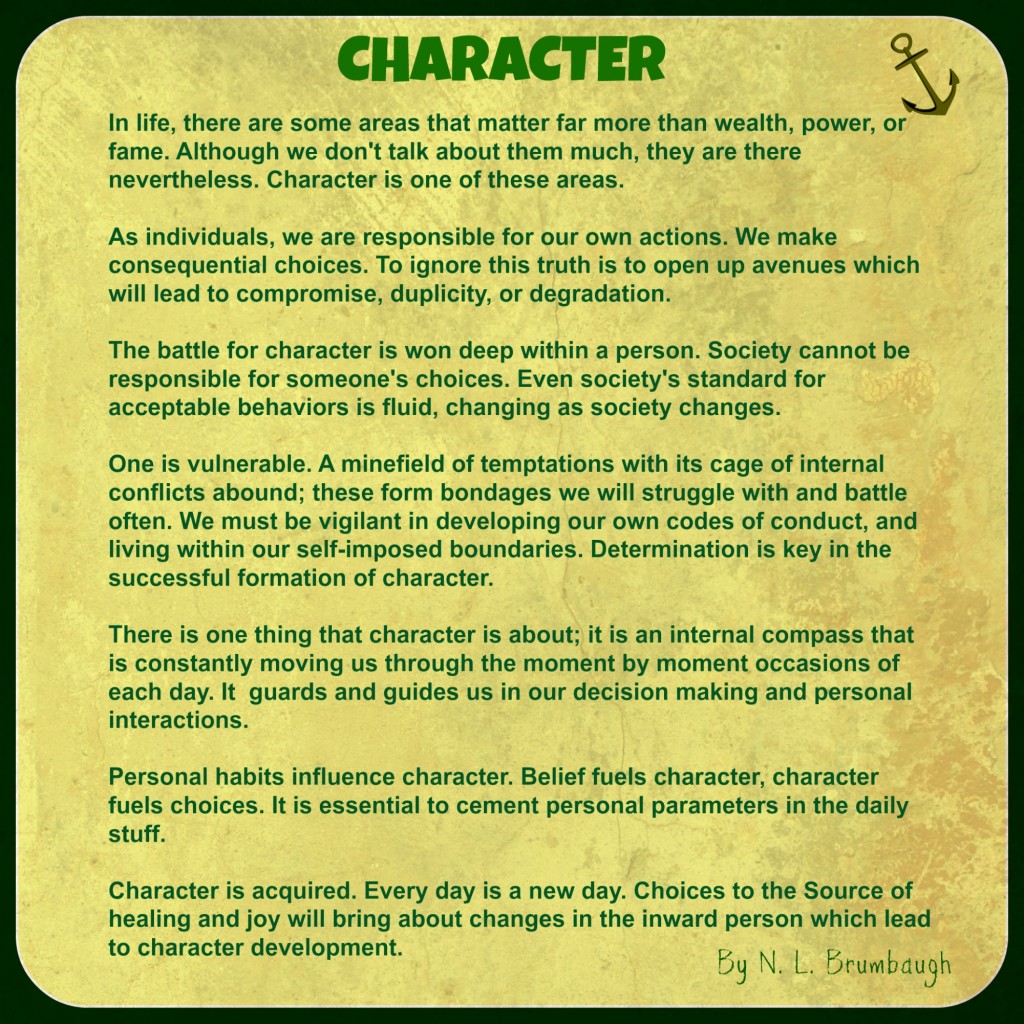I guess I’m a little old fashioned.
Character matters. There are some things I miss in this day and age. I miss the old days when a person’s word was their bond, when a handshake meant good faith that each person would keep their agreement. I miss people being honest, valuing integrity, and honorable in action and deed, when lying was considered a sin and not part of doing business, an excuse for covering one’s tracks, as in the ‘end justifies the means.’ I dislike the term “I lied,” spoken so easily and frequently by people from all walks of life, who don’t think twice about the lies they tell to make the story jive for their benefit.
My parents raised us to be people of character.
My parents were intentional about their responsibility in raising us to be good stewards with our lives. They followed the golden rule and the ten commandments in their own lives, and they expected the same from us. I learned to believe in right and wrong with few gray areas. Although it sounds harsh by today’s relaxed standards, I do not believe it was. In fact, living with a sense of propriety and morality was sensible, practical, and important, allowing a framework for making life’s choices. It protects a person.
As a teenager and then as a young adult, I began to form my own character, to make my own standards of behavior.
It came down to choices. It is still about choices. It will always be about choices. Every day we make choices. The choices matter. To develop character that has staying power, one must figure out the parameters that will become the boundaries for the way each will live out their life. Without these boundaries, compromise is swift, it is around every corner at work, in every school, and part of every kind of entertainment. A guard must be erected within one’s thinking. This is necessary to keep one’s mind clean, one’s habits appropriate, one’s business honest, one’s behaviors circumspect. A Christian should care about their character. Since it is attached to Christ’s name, it takes on a greater meaning. God wants us to be people of his way. His way is just and pure, loving and kind, forgiving and strong.
Suggestions for building character:
1. Look at the guidelines found in the scriptures. The Ten Commandments’ guidelines are a starting point.
2. Determine that you will choose to live honestly and with integrity (even when it is challenging).
3. Choose like-minded friends who live in a similar way. Stay away from people who negatively influence you or bring you down.
4. Remove yourself from areas that lead to compromise, addictive behavior, or deceitful practices.
5. Do the right thing, even if you have to go it alone. Stand by your principles (know what they are).
6. Don’t cheat, brag, or self-promote; don’t devalue others, put-down others, or act with prejudice.
7. Humble yourself, tone down the over-reaching pride, be grateful for the gifts you’ve been given.
8. Help others, often, and with little thought for self. This is a beautiful character trait!
9. Self-assess frequently, keep yourself in check, notice warning signs…those little temptations.
10. Strive to be kind in word, action, and attitude. Bless others by caring about them.
A farmer must plant the seed in fertile ground. He cultivates the ground, then plants the seed in the tilled soil. The farmer waters the seed, he removes the weeds, he adds nutrients to the soil. The farmer prunes when needed, and encourages sunlight to reach the plants for abundant growth. The crop is harvested after all this has been completed, after much effort, time, and expense has been incurred. The same is true for character. It is developed, nurtured, lived out. It will have a good harvest when the cycle is completed. People of character stand out. They are believed and not doubted. They are honored and not despised. They have depth beyond their peers. Character matters.


